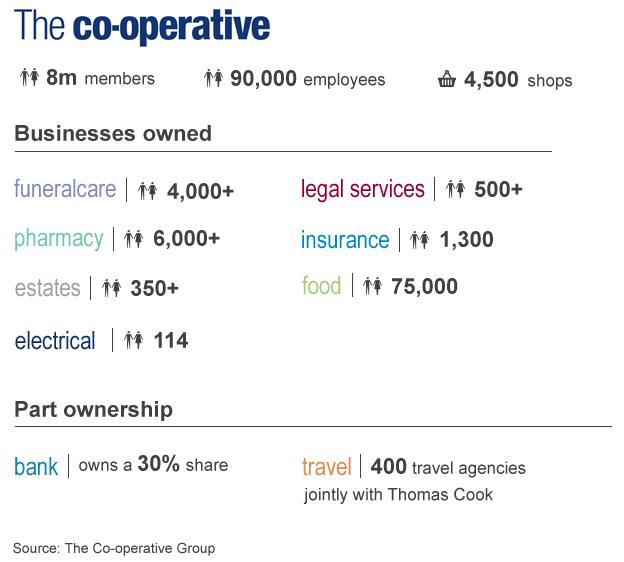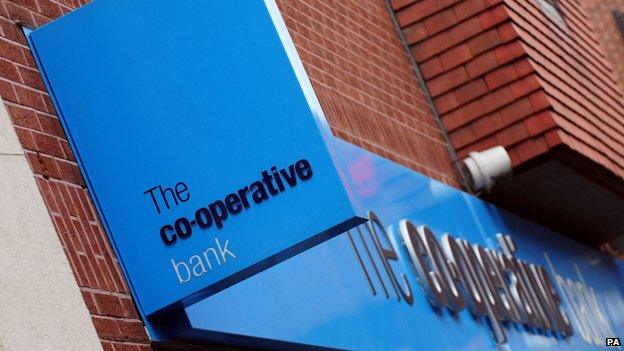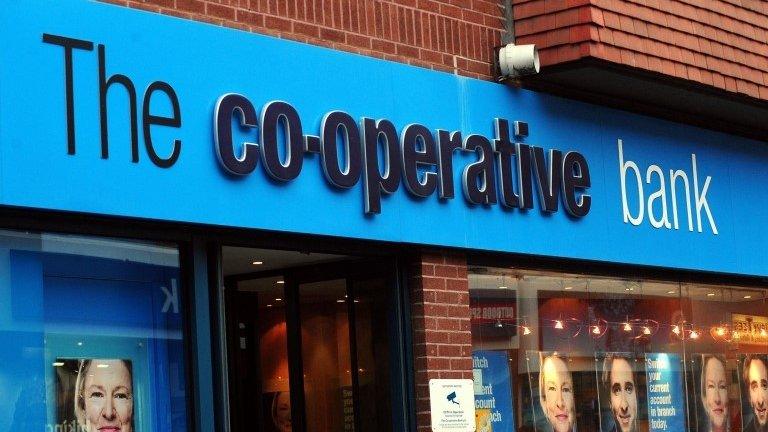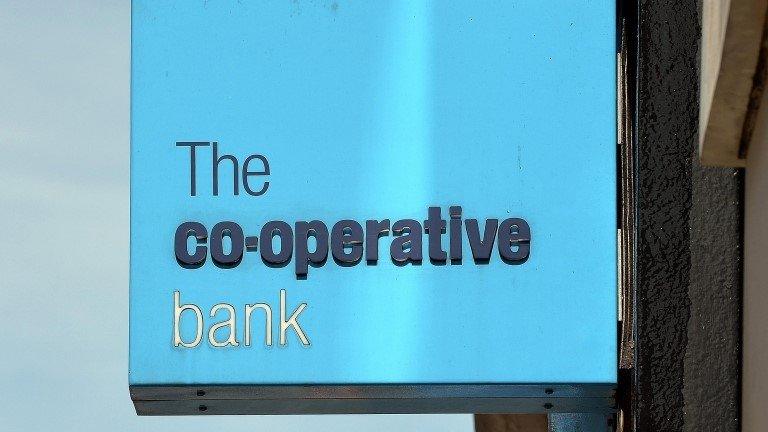Co-op Bank and Britannia merger 'should never have happened'
- Published
Sir Christopher Kelly: "It's easy to blame individuals... but what I've tried to show is that this was a systematic failure"
The Co-operative Bank's merger with the Britannia building society in 2009 should never have happened, a major review of the organisation has said.
Sir Christopher Kelly's report blames the deal for the bank's near-collapse last year.
His report states both companies had problems that were exacerbated by the merger.
It also points to failings in management and governance "on many levels".
Sir Christopher added the deal might have worked had the organisation received first-class leadership, but "sadly it did not".
Sir Christopher told the BBC's Radio 4 Today programme: "It is the merger [between the Co-op Bank and the Britannia], not the Britannia itself that caused the problems."
He said both organisations brought problems to the deal.
In Britannia's case, it was the vast size and unwieldiness of its commercial property loan book.
But the Co-op Bank had several problems of its own, including its approach to risk when lending money to customers and a large IT project that was already under way, which the merger "vastly complicated" and which ultimately contributed £300m to the bank's eventual capital shortfall .
Sir Christopher added that the Co-op Bank "had a legacy of mis-selling payment protection insurance (PPI), which was not unusual at the time, but is particularly disappointing for an ethical bank".

Financial crisis
Among other reasons for the near-collapse of the bank identified by the report , externalare the economic environment following the 2008 financial crisis and the demand from financial regulators for banks to hold increased levels of capital that followed.
Niall Booker, chief executive of the Co-operative Bank said he broadly accepted the findings of the report, which he admitted would "make difficult reading for our customers".
But Mr Booker added: "We do believe there are many more positive aspects of the Co-operative Bank's culture that are not reflected in the report - for example, not enough credit is given to the service ethic and empathy of our employees."
He apologised again for "past failings" and reiterated his commitment to "restoring the bank to financial health".
Richard Pennycook, interim group chief executive of the Co-operative Group, said: "Following the wake-up call of our recently announced £2.5bn loss, Sir Christopher Kelly's report today lays bare the failings of management and governance that caused it.
"It is a sobering assessment which shows clearly that the Co-operative Group's loss of control of its bank could have been avoided."
Profits hit
The report added that the financial crisis and the response to it by regulators and policymakers were the only factors outside the Co-op Bank's control.

Sir Christopher Kelly's report says the Co-op Bank's had its own problems before the merger with Britannia
Unlike a number of other financial institutions, before the merger, the Co-operative Bank obtained most of funding from its own customers' deposits.
As a result, it was not adversely affected when the international money markets dried up during the financial crisis and considered itself as having "weathered the crisis well".
But the bank was hurt by the prolonged period of low interest rates introduced by the Bank of England, which depressed its net margins and profitability.
The bank's problems were further complicated by the fact that some of its customers ran into difficulties, particularly business customers involved in commercial real estate - a market that itself all but collapsed following the financial crisis.
That depressed the value of the bank's assets and made it more difficult for its clients to refinance, limiting the Co-op Bank's ability to reduce its own heavily concentrated exposure to the sector.
The commercial loan book that the Co-op Bank inherited as part of its merger with Britannia stood at £3.7bn and accounted for as much as half of its lending and a greater proportion of its regulatory capital, the report added.
The Co-op Bank wanted Britannia's personal customers and retail branches. But in acquiring them, it was also saddled with a "substantial volume of assets well outside its risk appetite in terms of type, loan-to-value or concentration risk".
Watchlist
Equally troubling, for the bank and the Financial Conduct Authority (FCA) alike, the regulator admitted to the bank's board in July 2011 that it did not believe Britannia would have survived, had it not been for its takeover by the Co-op.
In fact, so concerned was the Financial Services Authority (FSA) - the FCA's predecessor - about Britannia's financial position that at the time of the merger between the Co-op Bank and the building society, it had placed the mutual on a watchlist.
It was not the FSA's policy, however, to advise all firms of their inclusion on a watchlist, the report added.
The Co-op Bank's small capital base also meant that it would be less resilient than some others to significant shocks, including "self-inflicted" ones, Sir Christopher found.
Neville Richardson, the former chief executive of Britannia who became the boss of Co-op Bank in 2009 - Co-op Financial Services as it was at the time - is also heavily criticised by the report, which points out he had never worked at the bank before taking on his role.
In his evidence to the Treasury Select Committee, Mr Richardson argued one of the reasons for the difficulties the Bank faced after he left in 2011 was that a number of senior ex-Britannia staff also left at the same time.
But Sir Christopher said there was "overwhelming evidence" that the bank was already in difficulty by 2011.
"The capital position only looked reasonable because problems had been pushed into the future. The risk management framework was poor. The IT project was floundering; and there was little sign of a coherent strategy towards the non-residential mortgage portfolios inherited from Britannia other than to wait for things to get better," the report stated.
- Published22 April 2014
- Published11 April 2014

- Published22 April 2014
